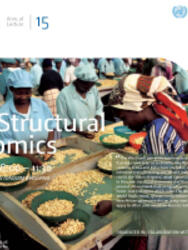WIDER Annual Lecture 15
From Flying Geese to Leading Dragons
New Opportunities and Strategies for Structural Transformation in Developing Countries
Structural transformation is a pre-requisite for sustained growth and poverty reduction — such was the conviction of development economists in the mid twentieth century. They demonstrated empirically that moving resources out of low-productivity primary activities sustains the productivity gains that characterize economic development. Industrialization was thus recognized as a key engine of economic growth. Policy makers and researchers in developing countries keen to catch up with industrialized countries focused on fast modernization, but the import-substitution strategies adopted in the 1950s and 1960s led to well meant but misguided government policy which gave rise to expensive mistakes and low or no structural transformation. Unfortunately, the remedies for these policy mistakes often consisted simply of rejecting almost any government interventions in industrial development and structural transformation on the ground that they could only lead to government failures. In the late 1970s and 1980s, under the dominant new development paradigm known as the Washington Consensus, it was assumed that if the business environment was improved, the private sector would spontaneously seize business opportunities, creating jobs and prosperity. A generation later many developing countries still have not experienced structural transformation. Instead, many of them have experienced structural regression, with manufacturing contributing a declining share of GDP. Only a small group of countries in Europe, Asia, Latin America, and Africa have been able to engineer sustained dynamic growth and structural transformation and achieve convergence with high-income countries. They have generally done so by using market mechanisms and government facilitation to replicate, in different contexts, the same types of development paths that allowed previously successful countries to ignite what Kuznets called the period of ‘modern economic growth’.The 15th WIDER Annual Lecture was given by Professor Justin Lin Yifu in Maputo on 4th May 2011, under the title ‘From Flying Geese to Leading Dragons: New Opportunities and Strategies for Structural Transformation in Developing Countries’.
 Join the network
Join the network